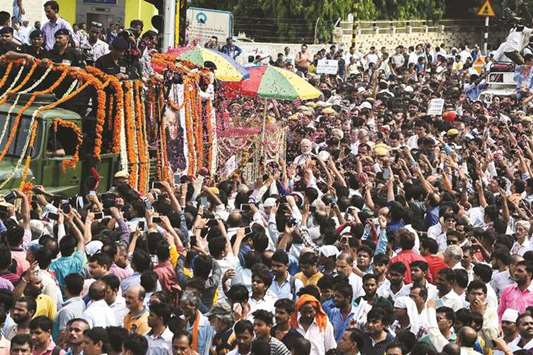Tens of thousands of mourners joined the funeral procession of former prime minister Atal Bihari Vajpayee, one of India’s most popular politicians, in New Delhi yesterday.
Vajpayee, a founding leader of the ruling Bharatiya Janata Party, died on Thursday at the age of 93.
He was admitted to the All India Institute of Medical Sciences, where he was being treated for a kidney infection and chest congestion.
The former premier’s body was cremated with full state honours at a memorial near the banks of the Yamuna River yesterday evening.
Vajpayee’s foster daughter, Namita Bhattacharya, lit the funeral pyre amid the chanting of Hindu Vedic hymns after the firing of a 21-gun-salute by soldiers.
Top leaders, including Prime Minister Narendra Modi, and foreign dignitaries, like the Bhutanese King Jigme Khesar Namgyel Wangchuck and former Afghan president Hamid Karzai, were present.
Among others present were President Ram Nath Kovind, Vice President M Venkaiah Naidu, former prime minister Manmohan Singh, Lok Sabha Speaker Sumitra Mahajan, veteran BJP leaders and Vajpayee’s long-time associates L K Advani and Murli Manohar Joshi, Rashtriya Swaymasevak Sangh chief Mohan Bhagwat, Home Minister Rajnath Singh, External Affairs Minister Sushma Swaraj, Defence Minister Nirmala Sitharaman and Congress president Rahul Gandhi.
The foreign dignitaries included Nepal’s Minister for Foreign Affairs Pradeep Kumar Gyawali, Sri Lanka’s Acting Foreign Minister Lakshman Kiriella and Bangladesh Foreign Minister Abul Hassan Mahmood Ali.
Earlier in the afternoon, Modi, along with top BJP leaders, walked a 4km stretch amid a sea of people as the cortege wound its way to the cremation ground.
People chanted “Long Live Atal Bihari” and showered rose petals on the glass casket carrying the politician’s body.
All through the day, massive crowds paid their last respects to the leader at his residence, and later at his party headquarters, where his body was kept for homage.
“I am speechless, numb,” Modi had said, while grieving Vajpayee’s demise on Thursday. “It’s like losing a father.”
The government has announced seven days of national mourning.
Schools and offices were shut across many states yesterday.
Vajpayee served three times as prime minister: first for 13 days in 1996; for several months between 1998 and 1999; and then a full-term from 1999 to 2004.
He retired from politics in 2005.
Vajpayee played a pivotal role in making India a global nuclear power.
His administration surprised the world by conducting a series of underground nuclear tests in 1998.
India first carried out nuclear tests in 1974.
The tests sparked fears of a nuclear war with Pakistan, but Vajpayee later launched a landmark peace process with Islamabad.
The BJP patriarch had been suffering from ill health in the past years and remained confined to his home.
He suffered a stroke in 2009 and was also hospitalised that year with a serious respiratory infection.
Vajpayee was considered one of India’s most respected leaders, with friends and admirers across the political spectrum.

Prime Minister Narendra Modi walks behind a truck pulling the coffin with the body of Atal Bihari Vajpayee during a funeral procession in New Delhi yesterday.
